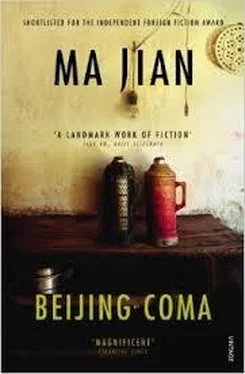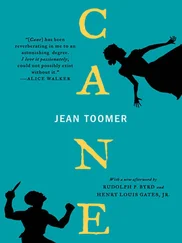‘I thought you were one of the brave ones, Dai Wei.’
‘I don’t want to argue with you. Shu Tong and Liu Gang talked to you last night, and they weren’t able to change your mind. Hey, someone from the bus company came to ask if we could get the students off the buses. They need them back now.’
‘Tell them they can take them away. We must get rid of them before the army turns up, or they’ll get smashed. Ask someone to broadcast an announcement telling everyone to vacate the buses immediately.’
Wang Fei walked up holding a megaphone. His black leather shoes sparkled in the sunlight. He wasn’t wearing socks. His bare ankles looked very pale, even through the dark lenses of my sunglasses.
‘I’ve just spoken to a journalist,’ he said. ‘Guess who he bumped into in the Workers’ Stadium? Deng Xiaoping’s son, Deng Pufang — you know, the one in the wheelchair. The journalist asked him what he thought of the student demonstrations, and he said, “The sky must remain above and the earth below. Whoever tries to change the natural order will perish.”’
‘Do you understand now?’ I said, turning to Old Fu. ‘The government thinks we’re trying to topple the state, and they’re determined to crush us. Let’s pack up and go back to our campuses.’
‘Don’t surrender so soon,’ said Wang Fei. ‘This is the moment we finally force the Communist Party to hand over power to the people. Only the brave are victorious.’
‘Apparently another of the students who went on hunger strike has fallen into a coma,’ said Old Fu. ‘Can you ask Tian Yi to find out who it is?’
‘I’ve almost sunk into a coma myself!’ I said. ‘I’m so exhausted, I can’t think straight.’
‘I must find Bai Ling,’ said Old Fu. ‘We’re supposed to be going to another meeting of the Capital Joint Liaison Group.’
‘Han Dan went to the last one, claiming he was the representative of the Beijing students,’ Wang Fei said, fiddling with the switch of his megaphone. ‘He’s as bad as the Communist Party. None of us asked him to represent us.’
‘Will you look after logistics while I’m away, Dai Wei?’ said Old Fu. ‘A factory manager has donated more towels and torches. Get some volunteers to distribute them. Wang Fei, you need to print out more leaflets informing the students how to protect themselves against tear gas. Chen Di has got hold of a special antidote. If there’s a gas attack, you just dip your towel in it and hold it to your face. Hurry up now, there’s no time to waste.’ Old Fu glanced at his watch then went to look for Bai Ling.
‘There are only bread rolls for lunch today,’ I said as I followed Wang Fei onto the upper terrace. The three students running his propaganda office were printing leaflets on the mimeograph machine.
You watch a cell disintegrate within the coffin of its plasma membrane.
Tian Yi was sitting in the broadcast minibus chatting with the Hong Kong students. Miss Li was there, her hair slicked back into a neat ponytail that was so shiny it looked wet. You could tell at once she was staying in a hotel. I remembered that A-Mei’s hair was sleek and smooth like that. She used to wash it every day. Tian Yi and Mimi looked scruffy in comparison.
‘Of course we won’t be able to fend off 200,000 soldiers, but if we go back to the campuses now, we’ll become scattered, and it will be easier for the government to arrest us,’ Mimi said, repeating a view she’d heard Bai Ling express.
‘Why do we have to use such boring methods?’ said a Hong Kong girl called Jenny. ‘There are more exciting ways of resisting violence than sitting on the ground!’ She was chair of the Hong Kong Student Association, and spoke in a thick Cantonese accent. She was wearing baggy trousers that tapered at the ankle. It was a style that hadn’t reached Beijing yet.
‘Yes, we should organise a massive student carnival,’ Mou Sen said, looking up from the stack of accounts he was checking through. Earlier that morning, the Hong Kong Student Association had handed over tens of thousands of Hong Kong dollars to him, or rather to the Beijing Students’ Federation. He should have had bodyguards protecting him.
‘You’re right, you can’t learn about democracy from books,’ I muttered. ‘We should be imaginative and think up strategies of our own.’
‘Our only reference point is the Cultural Revolution, so there’s always a danger this democracy movement will degenerate into a communist-style rebellion,’ Mou Sen said earnestly to the two Hong Kongese girls, raising his head once more from his papers.
‘I was only seven years old when the Cultural Revolution ended,’ Mimi said. ‘What influence could it have had on me?’ Then she opened the window and yelled out, ‘Hey, Old Fu! Come here! We’ve been given a pile of student ID cards that were found lying around in the Square. We couldn’t broadcast the students’ names in case there were government spies listening, so we just asked anyone who’d lost their ID card to check these ones, but no one’s come over yet.’
‘Well, just keep hold of them for the time being,’ Old Fu shouted back, irritated by Mimi’s lack of common sense.
Five military helicopters suddenly came crawling through the sky, so low that they almost scraped the tip of the Monument’s obelisk. Everyone became agitated. The ground rumbled as the air overhead pressed down on us. Tian Yi stuck her head out of the window, gazed up at the helicopters and excitedly reached for her camera, but her hands were shaking so much she couldn’t unzip the case. Earlier that morning, Chen Di had broadcast an announcement calling for students to fly kites or release balloons to prevent army helicopters airlifting soldiers into the Square. A shopkeeper had donated a box of large silvery balloons, but they weren’t any use to us as we didn’t have any helium.
The helicopters completed another circle of the Square, dropped a cloud of leaflets into the air then flew away.
‘That’s too much!’ Mou Sen muttered. ‘How dare the government drop leaflets when their own martial law edict strictly forbids such actions?’ Then he jumped out of the minibus and, like all the other students in the Square, dashed around frantically, grabbing as many leaflets as he could.
The sky was so blue and clear after the helicopters left that when anyone walked across the Square that morning, their gaze was inevitably drawn upwards.
The winged dragon, Yinglong, lives in the north-east corner of the Great Wastes. Since he killed Ziyou, he has been unable to return to the heavens and make rain fall from the clouds. Whenever a drought sets in, the local people dress up as him and pray for the rains to fall.
In the afternoon, Hai Feng rushed over to the minibus looking for Old Fu. He said a large crowd had gathered below Tiananmen Gate because three men had just thrown ink-filled eggs at Chairman Mao’s portrait. The crowd by the Gate had become very rowdy, and he was worried a brawl might break out.
Everyone was shocked by this news, and suspected that the culprits were agents provocateurs, deliberately vandalising the portrait to give the government an excuse to launch a crackdown.
‘Old Fu and Bai Ling haven’t come back from the Capital Joint Liaison Group’s meeting yet,’ said Mou Sen. ‘Go and find out whether those three men are working for the government.’
‘It’s a government plot!’ Wang Fei said, raising his index finger. ‘No question about it! Come on, let’s check it out.’
We ran over to Tiananmen Gate and looked up at the portrait. Chairman Mao’s pale face was flecked with black ink and red paint. One large splat between his eyebrows had trickled down to his mouth. But the painting was so huge that the specks didn’t diminish the Chairman’s imposing air. Hordes of students and Beijing residents had gathered below the portrait to take a look. Some praised the vandals, others accused them of reckless stupidity, but most were too busy taking photographs to say anything.
Читать дальше












